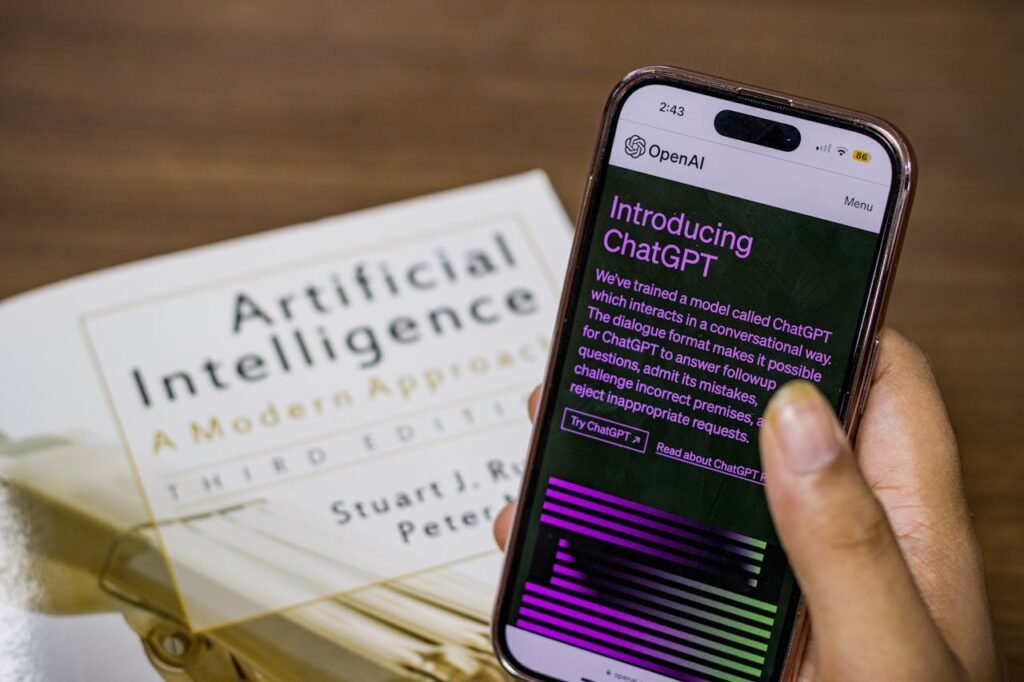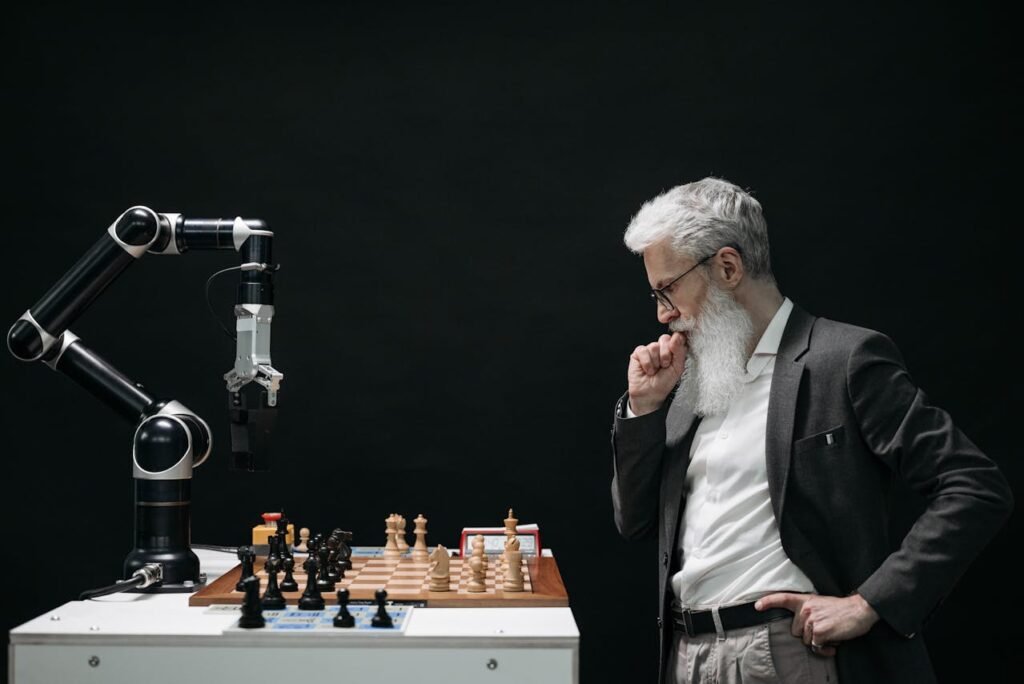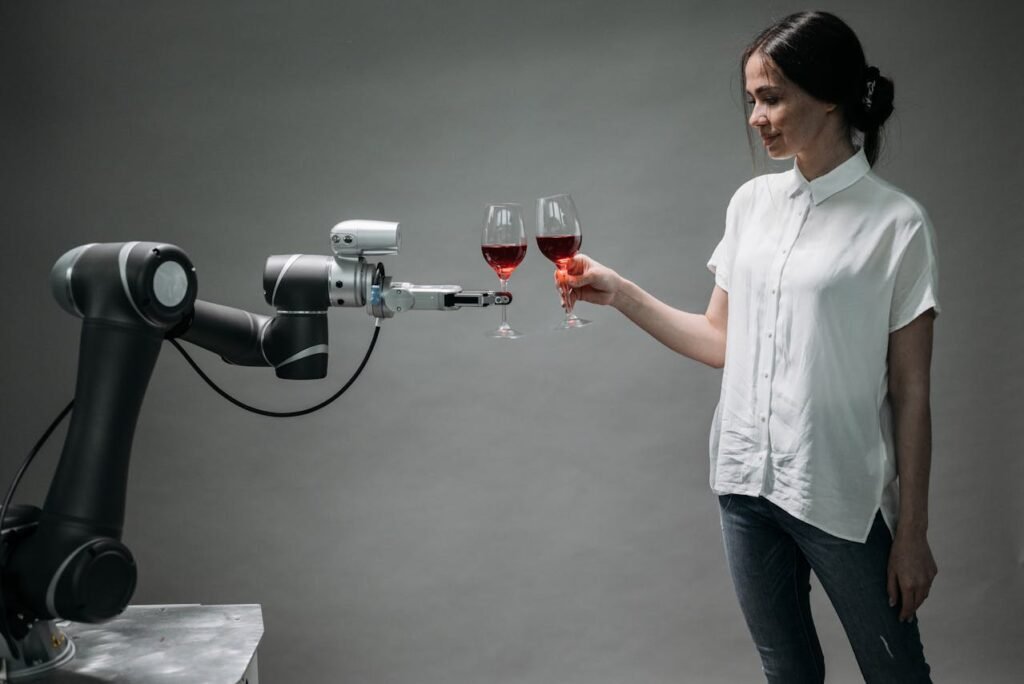As we navigate through the 21st century, artificial intelligence is quickly shaping the future. You’ve likely heard discussions about AI, from voice-activated devices in our homes to sophisticated robots capable of learning and performing tasks.
The conversation around AI is filled with optimism from tech leaders like Jeff Bezos, who envisions a “golden era of AI,” while others express caution like Stephen Hawking, who warned about its potential risks.
This blog post lists 75 insightful quotes on AI from a variety of experts, innovators, and thought leaders. These perspectives offer a broad look at AI, ranging from those who champion its ability to solve global challenges to those who urge careful consideration of its ethical implications.
Whether you have an interest in technology, are curious about AI’s impact on employment, or are simply pondering what the future holds, these quotes on AI provide valuable insights. Let’s Go!
Quotes on AI Table of Contents
Optimism and Potential Benefits of AI
Jeff Bezos: “I think we’re on the edge of a golden era of AI.”
Andrew Ng: “AI is the new electricity.”
Demis Hassabis: “AI will be one of the best tools ever created for reducing poverty and improving the quality of life for everyone.”
Ray Kurzweil: “AI will enable humans to address their needs, desires, and the grand challenges of humanity.”
Ginni Rometty: “The AI era is here. It’s a new kind of capital. It’s intellectual capital.”
Peter Diamandis: “AI is the tool that will help us unleash human potential.”
Marc Andreessen: “AI will make it possible for computers to learn, improving themselves over time.”
Rajat Monga: “AI is democratizing the ability to innovate.”
Daphne Koller: “AI has the potential to revolutionize how we live, work, and learn.”
Mustafa Suleyman: “The promise of AI is to help us make a leap forward in solving complex societal issues.”
Cynthia Breazeal: “AI can transform our lives for the better, but we must approach it with caution and responsibility.”
Carlo Ratti: “AI will make our cities smarter and more efficient, but we need to ensure it’s used ethically.”

Ethical and Societal Considerations
Bill Gates: “AI is like nuclear energy — both promising and dangerous.”
Sam Altman: “Artificial intelligence will drive the human race.”
Tim Cook: “We’re not in the business of trying to trick you into giving up your personal information. We believe the customer should be in control of their own information.”
Satya Nadella: “The real challenge is thinking about the ethics of AI and machine learning.”
Toby Walsh: “We need to be very careful with AI. The potential for AI to empower tyrants and autocrats is real.”
Joseph Weizenbaum: “AI forces us to confront complex questions about what it means to be human.”
Virginia Dignum: “We need to ensure that AI is developed in a responsible way, where ethical principles are adhered to.”
Francesca Rossi: “AI ethics is about ensuring that technology reflects human values.”
Margrethe Vestager: “We must ensure that AI is used to serve humans, not the other way around.”

AI, Humanity, and the Future
Stephen Hawking: “The development of full artificial intelligence could spell the end of the human race.”
Elon Musk: “AI doesn’t have to be evil to destroy humanity – if AI has a goal and humanity just happens to be in the way, it will destroy humanity as a matter of course without even thinking about it, no hard feelings.”
Yuval Noah Harari: “AI could help us to better understand ourselves and to evolve emotionally and ethically.”
Jane Goodall: “We need to use AI to help safeguard the future of the planet.”
Mitchell Kapor: “There will inevitably be surprises and unforeseen consequences with AI. We must remain vigilant.”
Judea Pearl: “AI will force us to rethink what it means to be human, and what it means to work, and create a new societal framework around it.”
Justine Cassell: “AI can extend the abilities of humans, not replace them.”
Rana el Kaliouby: “AI is becoming emotionally intelligent, and it’s changing the way we interact with technology.”
Jerry Kaplan: “AI is going to be either the best, or the worst thing, ever to happen to humanity. We do not yet know which.”
Luciano Floridi: “AI and digital technologies are becoming an integral part of our society and our individual identities.”
Greg Brockman: “AI has the potential to make lives easier, not just for us but for our children too.”

Technological Advancements and Challenges
Fei-Fei Li: “If we want our machines to think, we need to teach them to see.”
Geoffrey Hinton: “AI will eventually surpass the human brain.”
Kai-Fu Lee: “AI is going to change the world more than anything in the history of mankind. More than electricity.”
Rodney Brooks: “The most profound technologies are those that disappear. They weave themselves into the fabric of everyday life until they are indistinguishable from it.”
David Ferrucci: “Building AI is one of the most exciting scientific challenges of our time.”
Chris Bishop: “The goal of AI is to make machines that can perceive, reason, and act in the world.”
Michael I. Jordan: “We are far from having machines that can learn the most basic things about the world in the way humans do.”
Hod Lipson: “In the coming decades, AI will not only revolutionize our societies but also redefine what it means to be human.”

Critical and Cautionary Perspectives
Nick Bostrom: “Machine intelligence is the last invention that humanity will ever need to make.”
Eliezer Yudkowsky: “By far, the greatest danger of Artificial Intelligence is that people conclude too early that they understand it.”
James Barrat: “Our final invention, artificial intelligence, could one day spell the end for the human race.”
Ben Goertzel: “The singularity is near when humans transcend biology via artificial intelligence.”
Richard Dawkins: “The machine intelligence research institute’s mission of ensuring that the creation of smarter-than-human intelligence has a positive impact is critically important.”
Gary Marcus: “AI is the science of making machines smart.”
Paul Allen: “AI can be our friend.”
Peter Norvig: “AI does not need to be evil to be dangerous.”
Noam Chomsky: “The questions of whether machines can think is about as relevant as the question of whether submarines can swim.”
Yoshua Bengio: “We are still very far from superintelligent AI. But we should be preparing.”
Stephen Wolfram: “AI will lead to new ways of thinking about what it means to compute.”

Perspectives on AI’s Impact on Society and Work
Mark Zuckerberg: “AI is going to be extremely beneficial, and I think the story that gets told is somewhat more negative.”
Reid Hoffman: “AI is going to change the world more than anything in the history of mankind. More than electricity.”
Stuart Russell: “The question of whether a computer can think is no more interesting than the question of whether a submarine can swim.”
Jack Ma: “AI and robots are going to kill a lot of jobs because in the future, these will be done by machines.”
Kevin Kelly: “The business plans of the next 10,000 startups are easy to forecast: Take X and add AI.”
Dan Ariely: “We are not going to get rid of AI. The question is how do we live with it.”
John McCarthy: “As soon as it works, no one calls it AI anymore.”
Alan Turing: “We can only see a short distance ahead, but we can see plenty there that needs to be done.”
David Kenny: “AI will make personalization and empathy more critical than ever.”
Tom Mitchell: “The field of AI is closer to the infancy of aviation.”
John Hennessy: “AI and its impact on society is going to be more profound than the development of the personal computer.”
Joanna Bryson: “AI is not just another technology. It’s a fundamental shift in the way we understand and interact with the world.”
Tim Berners-Lee: “We need an internet where the AI’s work on our behalf, not for someone else.”
Vint Cerf: “AI will challenge us to think about what it means to be intelligent.”
John Giannandrea: “AI is one of the most important things humanity is working on. It is more profound than, I dunno, electricity or fire.”
Oren Etzioni: “We want AI to be robust and beneficial, without undesirable side effects.”
Susan Wojcicki: “AI can significantly improve our decisions.”
Larry Page: “AI would be the ultimate version of Google.”
Eric Schmidt: “AI will be the most significant transformation in human history.”
Neil deGrasse Tyson: “The moment we can replicate intelligence, it’s the beginning of the end for human dominance on Earth.”
Richard Sutton: “The biggest event in human history will likely be the creation of AI.”

Quotes on AI Conclusion
As we wrap up our journey through 75 powerful quotes on AI from leaders like Jeff Bezos and Stephen Hawking, it’s clear that artificial intelligence is shaping our future in big ways. These quotes on AI show us a world of possibilities, from incredible advances in technology to important questions about what it means to be human. Whether it’s the optimism of Bezos or the caution from Hawking, each quote adds to our understanding of AI’s impact.
This collection of quotes on AI isn’t just about predicting the future; it’s a call to all of us to think about how we’re going to be part of that future. It’s about being smart, ethical, and creative as we move forward with AI. The thoughts shared by these experts remind us that the story of AI is still being written, and we all have a role in deciding how it goes.
In short, these quotes on AI challenge us to dream big but also to act responsibly. As we look ahead, let’s keep these conversations going. The future of AI is not just in the hands of tech gurus and scientists; it’s in ours too. Let’s work together to make sure AI benefits everyone and leads us toward a better, smarter world.
Frequently Asked Questions about Quotes on AI.
What are quotes on AI?
Quotes on AI are insights, opinions, or reflections shared by experts, innovators, and thinkers about artificial intelligence and its impact on society, technology, and the future. These quotes often provide diverse perspectives on the benefits, challenges, and ethical considerations of AI.
Why are quotes on AI important?
Quotes on AI are important because they offer a wide range of viewpoints that can help us understand the complex nature of artificial intelligence. They inspire conversations about how AI is shaping our world, the potential it holds, and the caution we must exercise as it becomes more integrated into our lives.
Who typically provides quotes on AI?
Quotes on AI come from a variety of sources, including tech industry leaders like Jeff Bezos, renowned scientists like Stephen Hawking, AI researchers, philosophers, and even public figures. Their diverse backgrounds contribute to a rich tapestry of insights into the AI phenomenon.
Can quotes on AI influence public opinion?
Yes, quotes on AI can significantly influence public opinion by highlighting the potential benefits and risks associated with artificial intelligence. Influential figures can sway the public’s perception and spark debates on the ethical use, development, and regulation of AI technologies.
How can I learn more from quotes on AI?
To learn more from quotes on AI, consider reading articles, books, and interviews featuring AI experts and their perspectives. Attending conferences or listening to podcasts focused on technology and AI can also provide access to a wealth of quotes and discussions on the subject. I enjoy the Future Tense podcast by my friends at Content at Scale.

![You are currently viewing 75 Best Quotes on AI from Bezos, Hawking, and More [2024]](https://itsyourlifejourney.com/wp-content/uploads/2024/03/Quotes-on-AI.jpg)
![Read more about the article Home Designs AI Review: Easy and Fun [2024]](https://itsyourlifejourney.com/wp-content/uploads/2024/03/Home-Designs-AI-Review-Main-300x188.png)
Pingback: Humata AI: Best Way to Chat with PDFs in [2024] - It's Your Life Journey